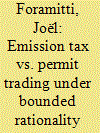| Srl | Item |
| 1 |
ID:
176116


|
|
|
|
|
| Summary/Abstract |
A price on emissions can be achieved through an emission tax or permit trading. The advantages and drawbacks of either instrument are debated. We present an agent-based model to compare their performance under bounded rationality and dynamic markets. It describes firms that face uncertainty about future demand and prices; use heuristic rules to decide production levels, trading prices, and technology adoption; and are heterogeneous in terms of production factors, abatement costs, and trading behavior. Using multiple evaluation criteria and a wide range of parameter values, we find that the main difference between the two policies lies in the fact that permit prices fall after successful abatement. This can lead to higher production levels under permit trading, but can also drive emission-efficient firms out of the market. Scarcity rents under permit trading can further create higher profit rates for firms, the extent of which is shown to depend on the mechanisms for market-clearing and initial allocation.
|
|
|
|
|
|
|
|
|
|
|
|
|
|
|
|
| 2 |
ID:
115141


|
|
|
|
|
| Publication |
2012.
|
| Summary/Abstract |
A flaw has been identified in the calculation of the cost-effectiveness in marginal abatement cost curves (MACCs). The problem affects "negative-cost" emissions reduction measures-those that produce a return on investment. The resulting ranking sometimes favours measures that produce low emissions savings and is therefore unreliable. The issue is important because incorrect ranking means a potential failure to achieve the best-value outcome. A simple mathematical analysis shows that not only is the standard cost-effectiveness calculation inadequate for ranking negative-cost measures, but there is no possible replacement that satisfies reasonable requirements. Furthermore, the concept of negative cost-effectiveness is found to be unsound and its use should be avoided. Among other things, this means that MACCs are unsuitable for ranking negative-cost measures. As a result, MACCs produced by a range of organizations including UK government departments may need to be revised. An alternative partial ranking method has been devised by making use of Pareto optimization. The outcome can be presented as a stacked bar chart that indicates both the preferred ordering and the total emissions saving available for each measure without specifying a cost-effectiveness.
|
|
|
|
|
|
|
|
|
|
|
|
|
|
|
|